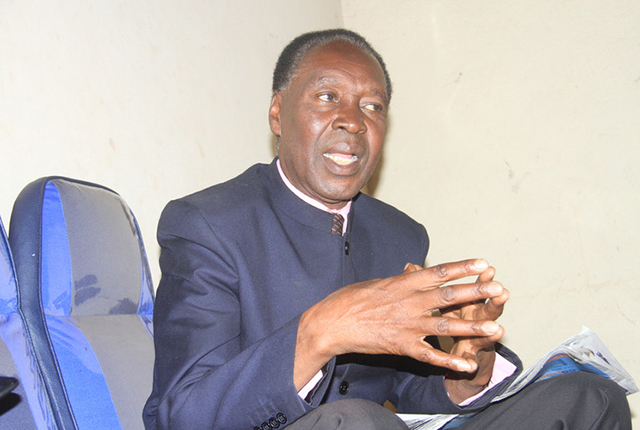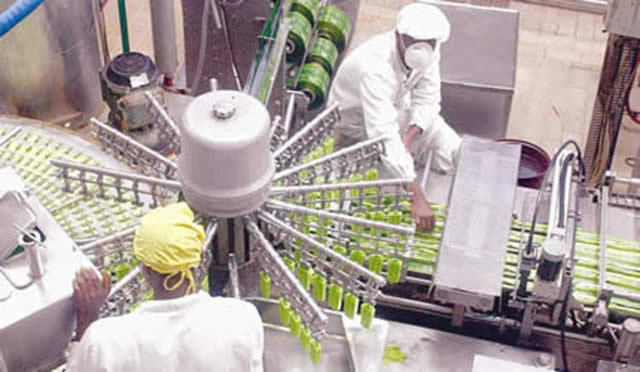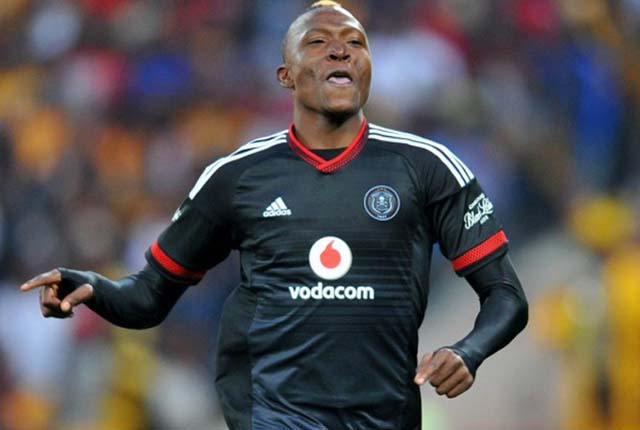Cde Rutanhire’s warning

Munyaradzi Huni Sunday Mail Deputy Editor
COMRADE George Rutanhire was a humble and gentle giant who never boasted about his achievements during the liberation struggle. He was among comrades, who “abducted” students at St Albert’s Mission as the freedom fighters recruited people to join the liberation struggle during the early years. Among the comrades he recruited was Cde Augustine Chihuri, who is now the Commissioner-General of Police, whom he recruited from Mangavi in Dotito. He later was part of the team that drafted the famous Mgagao Declaration. In ways likely to send shivers down the spines of some people, Cde Rutanhire spoke about what he called “huyotsetsa,” another war, which Mbuya Nehanda predicted would visit Zimbabwe after Independence. He also gave his perspective on why most of the rebellions during the struggle emanated from Manicaland. We publish his narration from the time he became director of the commissariat in Zanu.
MH: So in 1978, after so many years in the struggle, you were appointed director of the commissariat, tell us more about that appointment.
GR: In 1978, I became the director of the commissariat in Zanu and Zanla. The national commissar at that time was Cde Mayor Urimbo deputised by Cde Josiah Tungamirai. Cde Tungamirai was also the head of the commissariat in Zanla and was deputised by Cde Chiwenga. As director of commissariat I later formed two departments, one for research and the other for recreation and culture where I deployed people like Cde Chinx.
MH: As director of the commissariat what exactly was the Zanu vow?
GR: The aims of Zanu, zvido zveZanu. What the fighters were supposed to fight for. Yaiva mhiko yaitotaurwa ne each and every fighter. It was in the form of a slogan and went something like this: “Zanu, iwe neni tine basa! Chimurenga, chekusunungura Zimbabwe!”
The party elders told us that Zanu chose chibhakera as a symbol, yes to show unity, but also saying that only through unity that’s how we were going to win the war. The five fingers zvakabatana stood for something. The five fingers stood for “we are our own liberators.” Tikazviita izvozvi, tinotoisunungura chete Zimbabwe. This vow came from Dare ReChimurenga.
MH: You also had rules and regulations?
GR: We also had rules and regulations for Zanu. We had eight points of attention. Muuto wese weZanu aifanirwa kunge ari munhu akazvibata, munhu anozviisa pasi pepovho asi achichengetedza povho iyoyo. Tinofanirwa kutaura zvinetsika, tinofanirwa kutaura chokwadi. Hatifanirwi kunyepera povho. Hatifanirwi kutorera povho zvinhu zvayo, tinofanirwa kukumbira. Tikanyimwa hatifanirwi kugumbuka.
MH: You spoke about several divisions and rebellions that occurred since the early years of the struggle. Can you take us through these divisions?
GR: The first rebellion happened in 1974 — the Badza and Nhari Rebellion. Mbuya Nehanda’s spirit had warned us about this rebellion. Mbuya Nehanda had told us that pane mhaka dzakaparwa kumusha kuno and mhaka idzodzo, up to this day, hadzisati dzaripwa. She said kune nyaya yakaparwa kuManicaland during slave trade when mamwe madzimambo akatengesa vanhu as slaves vasina mvumo kubva kumhondoro. Madzimambo aitaurwa ndiMakoni and Mutasa. Due to this issue many people died during the First Chimurenga at Urombwe in Manicaland. These people vakada kunohwanda panzvimbo inoyera seeking protection kumhondoro.
This incident later caused the capture of Chief Chingaira. Chingaira was not killed during a battle. He was captured. The whites realised that he was overpowering them and they came up with a plan to capture him. They lured him by talking about ceasefire then they captured him. They shot him first, then later chopped off his head.
The chiefs were then told kuti zvakonzeresa izvi is the issue of the slave trade. These chiefs said this was a crime that was committed a long time ago and they were not responsible. So first was the Nhari-Badza Rebellion, then the spirits came to Ndabaningi Sithole.
The spirits want the Manicaland issue to be sorted. This issue can’t be solved by politicians. Inogadzirwa nemadzimambo nemhondoro. If that is not done, things will never be well in Zimbabwe. We were told about this a long time ago.
Mweya iyoyo from the Slave trade yakasimuka ikaenda panana Badza and Nhari, Sithole, then Muzorewa. It’s not that these people were bad, but these spirits. The last vanhu vakapanduka were vana Muparuri. These same spirits ndiwo wakanogara pana Nyathi. Morris Nyathi went into collusion with Muzorewa to commit Nyadzonya massacre. Mhondoro dzaitiudza tiri kunze kuti imi kune nyaya idzi dzinoda kuripwa.
When we came from the liberation struggle, kwakasimuka kamwana kadiki kanobva kuManicaland kanonzi Margaret Dongo kachiti kari kudawo huPresident. There was a lot of noise about Dongo, but it was not her fault. Akanga agarwa nezvikuru, zvinotyisa. But where did she go?
All these people hapana kana anotonga. From Margaret Dongo, these spirits came right into the Central Committee. I was actually there.
The spirits landed on Edgar Tekere. It was ZUM, ZUM, ZUM, Tekere akaipa! But where did he go? No one has ever bothered to ask kuti why nzira imwe chete iyoyi inoenda kumabvazuva? Tekere was the seventh from Manicaland. From Tekere, the spirits went to Dumbutshena then panaTsvangirai, then panaMakoni. Vakamonerwa vakomana vaya, havasi vega. Haisi mhosva yavo. Zvigara pavanhu zvakavagara. Why can’t this issue be sorted pamabvazuva apa?
MH: What exactly should be done and by who?
GR: The chiefs in Manicaland should sit down and look into this issue. We were told about this a long time ago. Vanofanirwa kuripa kumhondoro dzenyika ino. Madzimambo acho anofanirwa kutungamirirwa nemhondoro.
MH: This issue about spirit mediums some people don’t believe it?
GR: Yes, some people think hazvina basa, but it’s because havana kupinda muhondo. Some of us worked with mhondoro during the liberation struggle, we know what we are talking about. They guided us with precision during the war.
They would tell us when and where the next attack was coming. They would tell us of the exact time and the composition of the Rhodesian forces that were coming. They would also tell us how long the battles would be and tell us of the casualties. Today we say hakuna mhondoro papi? How? Mhondoro dziriko. Isu tiri kutonga nhasi tiri vagari venhaka.
MH: You earlier on spoke about huyotsetsa. What exactly was that?
GR: Mbuya Nehanda told us that after the attainment of Independence, muchasviko varairwa. Kutonga muchatonga, muchagara makore mokanganwa zvehondo izvi. Muchatirasa and muchatiramba. Makanganwa, muchamukirana zvichikonzerwa nekudya. Mukaona hondo iyoyo yaita, anopona ipapo ngaachifara achazofawo nerwaMwari. We were told kuti hondo iyoyi inonzi huyotsetsa.
I really don’t know whether we are already in huyotsetsa? Is it the sanctions or what? As former freedom fighters, we think pane ichauya. Kungofungidzira.
MH: You think it will come in which form?
GR: I really don’t know. But we worry when we see so many people thinking about forming their own parties and thinking they can rule this country. Some people, who don’t even know how this country got its independence. People who don’t even know that there should be order in the country.
Mukuru watinaye anonzi (President) Robert Mugabe hatina kungomuwana chiwanewane. Kuti aiswe ipapo hausi huchenjeri hwevapenyu chete. Just look back in history. Humambo hwekupedzisira huchigadzwa, hwakaiswa mumba mavo. During and after the liberation struggle vanhu vaida kutonga, but hapana akatora. Saka tinorasika papi?
MH: What do you think is the future of Zanu-PF?
GR: The values of the liberation struggle won us the war. If Zanu-PF ignores those values, the party will crumble. We can’t afford to forget those values. These values will bring stability to this country. All the leaders in Zanu-PF should know these values.
MH: With all that you went through, what is your message to the youths of today?
GR: Vana veZimbabwe zivai kuti nyika ino yakauya neropa. The enemy invaded this country and came with war. This country was conquered through the gun. For us to take back our country, lots of blood was shed. We took up the gun to fight so as to free this country. The youths should know that those who died also wanted to be alive in a free Zimbabwe.
Never, ever forget the liberation struggle. The white man will try to come back in different forms, including hiding behind some blacks. We should never surrender this country. The youths need to be told the history of their country.
Don’t force them, but they should be thirsty to know about their country’s history. We never fought to enrich ourselves. We fought for the future generations. We fought this country for them. Ngatirarame in our culture and tradition. Zimbabwe yakauya neropa. Tikasiya ichienda tinenge tava kupara ngozi.
The country’s history should be taught from crèche up to university. The youths should never be ashamed of talking about their country’s history. Ngatirege kusema mhondoro dzedu. Before whites came with the Bible, the people of this country vainamata Mwari wavo in their own way. Madzimambo should lead us again and they did during the liberation struggle.
The youths should never say tadzidza stereki. Hakuna kudzidza kunokunda kwekuzvarwa nako. Education is meant to polish us up, but we are born tichiziva.










Comments